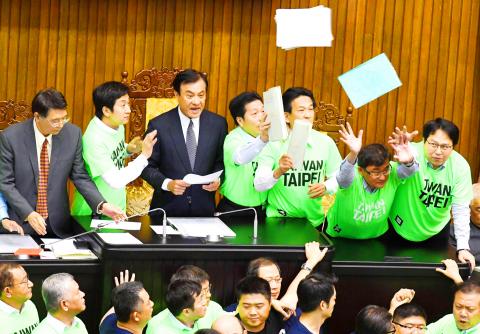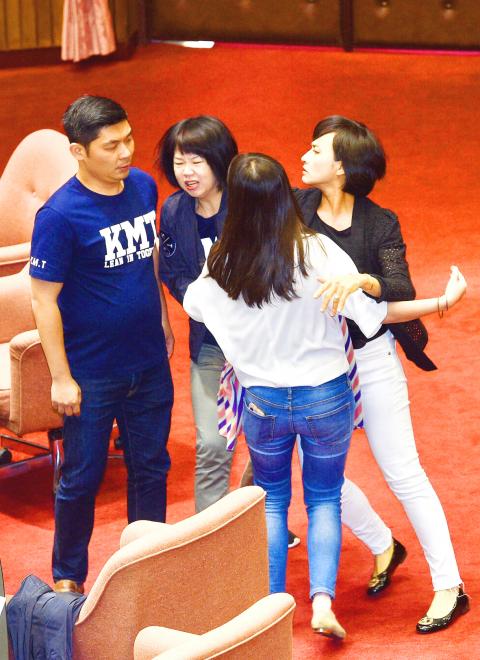A fracas broke out at the Legislative Yuan in Taipei yesterday before the Democratic Progressive Party (DPP) caucus sent a draft amendment to the Act of Military Service for Officers and Noncommissioned Officers of the Armed Forces (陸海空軍軍官士官服役條例) to committee review with a majority vote.
The Executive Yuan last week unveiled the draft amendment, which proposes setting the minimum monthly pension for retired military personnel at NT$38,990, gradually phasing out an 18 percent preferential interest rate on the savings of retired personnel enlisted before 1995 and a formula for calculating pensions for military retirees.
The DPP and the Chinese Nationalist Party (KMT) caucuses yesterday each submitted a motion regarding the proposed legislation at a plenary session of the legislature, with the DPP aiming to send the bill to committee review and the KMT opposing the move.

Photo: Sam Yeh, AFP
DPP lawmakers, who had been guarding the gates of the legislative chamber in shifts since Thursday, ensured that Legislative Speaker Su Jia-chyuan (蘇嘉全) had a clear path to the speaker’s podium, which was surrounded by KMT lawmakers.
Scuffles between the two parties’ lawmakers broke out shortly after the session began, plunging the chamber into chaos.
During the fray, KMT Legislator Andy Yang (楊鎮浯) tried to clamber onto the speaker’s podium and Su deflected him.

Photo: Peter Lo, Taipei Times
Upon seeing this, KMT caucus deputy secretary-general William Tseng (曾銘宗) shouted: “Violent speaker!”
The phrase was picked up by all of the KMT lawmakers, who soon began shouting it at Su in unison.
DPP Legislator Chuang Ruei-hsiung (莊瑞雄) began cursing after several KMT lawmakers tried to tackle him, while KMT Legislator Jason Hsu (許毓仁) needed medical attention after scuffling with DPP Legislator Chung Chia-pin (鍾佳濱).
Su kept his composure and continued to preside over the meeting, even as KMT Legislator Lai Shyh-bao (賴士葆), using a microphone the KMT had prepared, criticized the DPP in an attempt to drown out announcements by the speaker.
Each motion tendered was voted on twice at the KMT caucus’ request.
Despite the KMT’s protests, the bill advanced to committee review after gaining the backing of the DPP caucus, which controls 66 out of the 113 legislative seats.
The KMT caucus later held a news conference condemning Su for “pushing” Yang, saying that as legislative speaker he should remain neutral.
Su has set a world record for being the “first-ever legislative speaker to use violence” on a lawmaker, Tseng said.
Speaking on behalf of Su, Legislative Yuan Secretary-General Lin Chih-chia (林志嘉) said that Su’s actions were instinctive self-defense, as Yang apparently wanted to attack him.
It is regrettable that an opposition party would resort to such a “malicious” obstruction tactic, Lin said, adding that Su would apologize if Yang believed that it is right to climb the speaker’s podium.

Taiwan is gearing up to celebrate the New Year at events across the country, headlined by the annual countdown and Taipei 101 fireworks display at midnight. Many of the events are to be livesteamed online. See below for lineups and links: Taipei Taipei’s New Year’s Party 2026 is to begin at 7pm and run until 1am, with the theme “Sailing to the Future.” South Korean girl group KARA is headlining the concert at Taipei City Hall Plaza, with additional performances by Amber An (安心亞), Nick Chou (周湯豪), hip-hop trio Nine One One (玖壹壹), Bii (畢書盡), girl group Genblue (幻藍小熊) and more. The festivities are to

Auckland rang in 2026 with a downtown fireworks display launched from New Zealand’s tallest structure, Sky Tower, making it the first major city to greet the new year at a celebration dampened by rain, while crowds in Taipei braved the elements to watch Taipei 101’s display. South Pacific countries are the first to bid farewell to 2025. Clocks struck midnight in Auckland, with a population of 1.7 million, 18 hours before the famous ball was to drop in New York’s Times Square. The five-minute display involved 3,500 fireworks launched from the 240m Sky Tower. Smaller community events were canceled across New Zealand’s

‘IRRESPONSIBLE’: Beijing’s constant disruption of the ‘status quo’ in the Taiwan Strait has damaged peace, stability and security in the Indo-Pacific region, MOFA said The Presidential Office yesterday condemned China’s launch of another military drill around Taiwan, saying such actions are a “unilateral provocation” that destabilizes regional peace and stability. China should immediately stop the irresponsible and provocative actions, Presidential Office spokeswoman Karen Kuo (郭雅慧) said, after the Chinese People’s Liberation Army (PLA) yesterday announced the start of a new round of joint exercises around Taiwan by the army, navy and air force, which it said were approaching “from different directions.” Code-named “Justice Mission 2025,” the exercises would be conducted in the Taiwan Strait and in areas north, southwest, southeast and east of Taiwan

UNDER WAY: The contract for advanced sensor systems would be fulfilled in Florida, and is expected to be completed by June 2031, the Pentagon said Lockheed Martin has been given a contract involving foreign military sales to Taiwan to meet what Washington calls “an urgent operational need” of Taiwan’s air force, the Pentagon said on Wednesday. The contract has a ceiling value of US$328.5 million, with US$157.3 million in foreign military sales funds obligated at the time of award, the Pentagon said in a statement. “This contract provides for the procurement and delivery of 55 Infrared Search and Track Legion Enhanced Sensor Pods, processors, pod containers and processor containers required to meet the urgent operational need of the Taiwan air force,” it said. The contract’s work would be